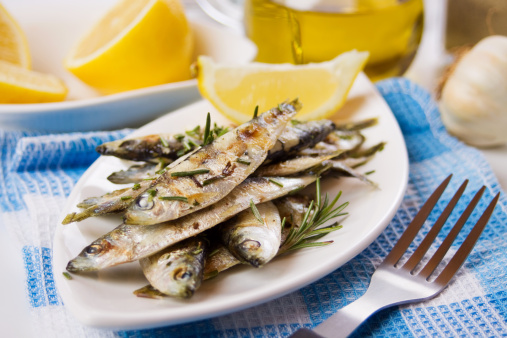
Sardines are not a stranger to many people, but it’s definitely a food that should be consumed more often. Sardines were named after Sardinia¸ an Italian island where the fish were first found. Although many people choose to eat canned sardines, the fresh variety is also quite tasty.
Sardines have been shown to have numerous health benefits, such as improving your heart, bone, and brain health and decreasing your risk of heart disease, osteoporosis, and Alzheimer’s. Sardines play a vital role in both the functioning of the nervous system and energy metabolism.
Sardines are an excellent source of nutrients, including omega-3 fatty acids, vitamin B12, iron, zinc, calcium, and vitamin D, as well as magnesium, phosphorus, and potassium.
For one serving (2.5 oz.) of this fish, you get 17 grams of protein, with only 150 calories.
Many people are now turning to sardines as their fish of choice because they do not contain contaminants such as mercury, as do many other fish, like tuna. Since they are at the bottom of the aquatic food chain, their main source of food is plankton, which makes them less likely to be contaminated with metals.
Because these fish are very perishable when fresh, they are usually preserved in cans. Fresh or opened cans are best consumed right away, but can be refrigerated for a couple of days.
Sardines can be enjoyed on their own, or drizzled with a vinaigrette or lemon juice and oil to add a tangy flavor. You can also try mixing them into a salad, combining them with vegetables and spices, or adding them to a sandwich.
If you’re buying sardines from a can, choose ones packed in olive oil instead of soybean oil for maximum benefit. If you’re watching your calories, choose sardines canned in water to limit the amount of fat you consume.
If you’re buying fresh sardines, look for ones that smell fresh, are firm when you touch them, and have bright eyes and glossy skin.
Sardines are a great, underrated food that I frequently enjoy because of their numerous health benefits. Enjoy them at your next meal!
Sources:
United States Department of Agriculture, “USDA National Nutrient Database,” Agricultural Research Service, December 7, 2011; http://ndb.nal.usda.gov/ndb/search/list, last accessed May 19, 2013.













